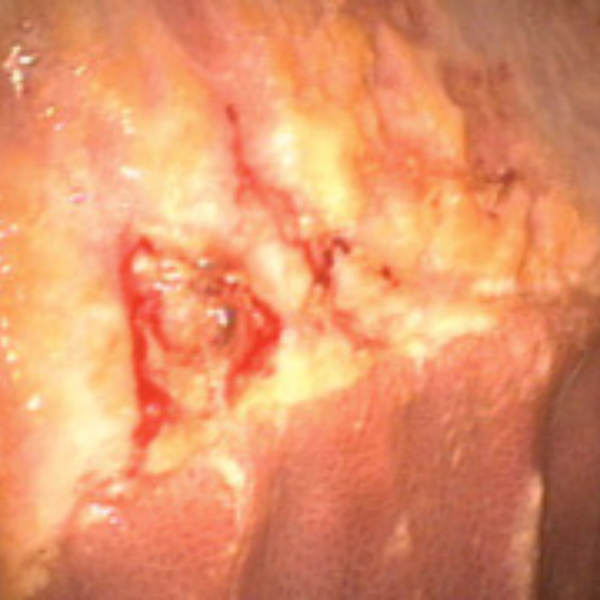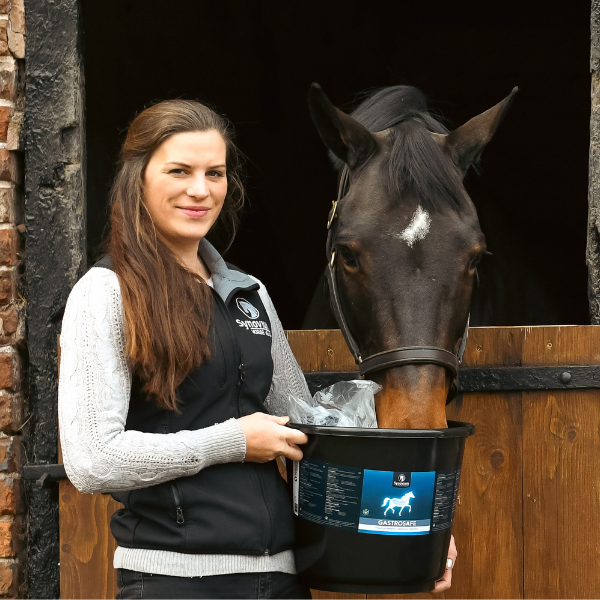Posted: 12th February 2023 | Back to news feed


Why your horse might be more prone to Equine Gastric Ulcer Syndrome (EGUS) during Winter...
As vets we often see more cases of equine ulcers as we head into winter due to the changes in the horses’ diets and routines.
Equine gastric ulcers have been recognised more in recent years and it is important to understand the condition, why it can occur and the symptoms to look out for, to help prevent the high occurrence for future horses.
Clinical signs of the disease include weight loss, diarrhoea, decreased appetite, behavioural changes, decreased performance and colic.
Ulcers can affect any horse, although particularly prevalent in performance horses.
What can trigger equine ulcers as we head into winter?
The most often cause is the sudden changes in a horse’s management and diet. An increase in hard feed, less time out grazing as nature intended. Stressors, caused by more time spent in the stable.
Horses are hindgut fermenters, therefore meaning that the large intestine is where breakdown of fibre takes place. Fibre is the main component of the horse’s forage which is broken down by microorganisms to produce essential nutrients that the horse absorbs.
Because the hindgut is geared for fibre fermentation, it is susceptible to upset due to receiving large amounts of undigested sugars. Often fed more in winter as we increase their hard feeds, and the availability of adlib forage and turnout is lessened.
The ideal balance between these good microbes and harmful bacteria can be easily upset, especially in winter. Let’s have a look why….
- Fasting or intermittent feeding has been shown to consistently induce gastric ulceration in horses. In the wild, horses are continuously grazing, so the stomach is rarely empty, the food in the stomach neutralises the stomach acid. When a domesticated horse experiences prolonged periods without forage, excessive amounts of acid build up causing ulceration to the gut lining.
- A predominantly grain diet would also upset the balance within the stomach. Diets high in concentrates have shown to induce or worsen gastric ulcers. The carbohydrate rich grains are fermented to volatile fatty acids and undigested starch which end up in the hindgut. It is recommended to avoid sudden changes to the diet (7-10 days at least is recommended) and only feed what is necessary.
- Horse being exercised on an empty stomach is thought to contribute to the development of gastric ulcers. Exercising causes an increased intra-abdominal pressure during which blood flow to the stomach is reduced and the pressure in the abdomen is increased. Therefore, pushing the acid up into the sensitive area of the stomach. We recommend feeding your horse prior to exercise, with forage, to help fill up the stomach and prevent acids from pushing up.
- Physical stresses such as illness, infection, injury, shock, parasites, travelling, and increased stabling can contribute to ulcers due to the restricted blood flow to the stomach and an increased acid production. Providing a buffer to the stomach such as adlib forage or natural anti acids will support the horses gut from access acid.
- Psychological stressors will also cause an increased in acid production and a higher risk of gastric ulcers. Mange stressors by allowing your horses as much time out as possible, provide toys for entertainment or companions. Keep routines from sudden change where possible.
It is important to keep the balance of good and bad bacteria exactly right for each individual horse.
Treating ulcers in horses
In any case of suspected gastric ulcers your veterinarian should always be consulted. In most cases a gastroscopy will conclude the presence, severity, and the location of the ulceration.
Prevention of ulcers is key we should mimic horses being in the wild by allowing them to graze often or have access to forage such as hay frequently. Horses should not go more than 4 hours without forage. This ensures neutralization of the stomach acid stimulating saliva production, which is nature’s best antacid. There are many ulcer supplements for horses on the market that claim to prevent gastric ulcers and you should only trust those that have been validated in competent scientific studies and veterinary trials.

Our veterinary studies showed 73% of supplemented horses, with Synovium Gastrosafe, showed an overall decrease in ulcer severity across all categories in 6 weeks when fed 100g daily across 3 feeds. The average ulcer score for the supplemented group decreased from 1.82 to 0.91 in that period.
Not just another supplement, Gastrosafe is researched, trialled, and studied by leading vets to make a difference.
For more information visit Synovium Horse Health UK.
The Equestrian Index newsfeed is compiled from articles submitted by advertising members and expresses the opinions of those members. Watsons Directories Ltd shall not be held liable for any inaccuracies or mis-statements therein.